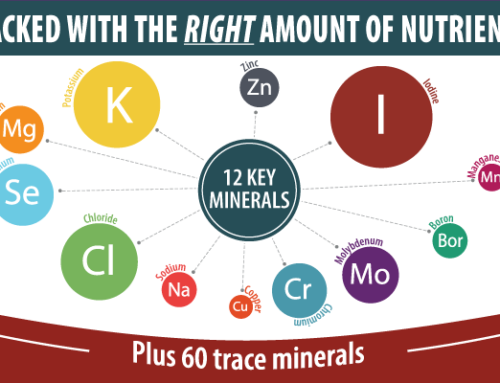This article examines the role of minerals for the immune system and will share the best supplements for immune systems. The immune system is made up of a vast and highly complex network of cells, tissues, and organs that are constantly working in unison to protect the body from sickness. Whether it is a cut or a break in your skin (which can allow dangerous bacteria to enter the body), or a virus or bacterial contagion that is able to enter the body through other means, our immune systems perform the extraordinary task of keeping us safe from infections and illnesses. This is why it is very important to keep your immune system functioning properly.
Nutrition, and more specifically, minerals and trace minerals, play an important role in immune function and health. In order for your immune system to function as it should, you need to maintain the proper balance of minerals. Dietary intake studies (not just in the U.S. but worldwide) show that the majority of individuals don’t meet the recommended dietary intakes for magnesium and select trace minerals.
Related article: Magnesium Deficiency – Needs for Magnesium not Met in Most People
Immunity is the body’s ability to effectively defend against antigens like viruses, bacteria, or even cancer cells that are constantly trying to undermine one’s health. But, for the immune system to function as it should, it must be able to distinguish its own cells and tissue versus antigens. People who are deficient or have low levels of certain minerals (magnesium, zinc, selenium, and other trace minerals) may be at risk for impaired immune function. If an individual has an impaired immunity, the body’s natural defenses could quickly be overwhelmed, which could result in serious infection, illness, and even death.
The Three Types of Immunity
- Innate immunity: This is each person’s inborn, or natural, protection, which acts as our first line of defense.
- Adaptive immunity: Develops as you are exposed to pathogens or are immunized.
- Passive immunity: Passive immunity is immunity one “borrows” temporarily from another source. Newborns, for instance, obtain antibodies in their mother’s breast milk, which helps protect them from diseases to which the infant’s mother has been exposed.
So, how does our immune system work?
White blood cells or leukocytes, which include two sub‐types, phagocytes, and lymphocytes, are constantly seeking out antigens or microorganisms that cause disease or illness. Phagocytes attack invading organisms. Lymphocytes allow the body to recognize and “remember” previous invaders and then help to wipe out these invaders.1
Lymphocytes originate in the bone marrow from stem cells, and there are basically two types of lymphocytes. T lymphocytes originate in bone marrow but eventually, migrate to the thymus. B lymphocytes mature in bone marrow and stay there. Lymphocytes enter the bloodstream and become lodged in tissues and organs, like the spleen, lymph nodes, and tonsils, where they are encased in a delicate network of connective tissue. This system directs lymphocytes, so they come into direct contact with antigens. Lymph fluid that is drained from lymph tissue found throughout the body is pumped to the blood through lymphatic vessels. Lymph nodes distributed along these vessels filter the lymph exposing antigens to the lymphocytes. 1
When an antigen has entered the body, the B lymphocytes will identify the antigen and, through different reactions, will produce antibodies (immunoglobulins) that are proteins that lock onto the antigen. These antibodies remain in the body in case the same antigen is introduced again. After binding to an antigen, antibodies then initiate complement. And, from there, a complex cascade of events occurs that work together in killing bacteria, viruses, or infected cells.2 But it is the T lymphocytes that are the ones who destroy the antigens or infected cells. T cells also communicate or signal other cells like phagocytes to vanquish the invaders.
How to Build the Immune System with Good Nutrition
Nutritional status has a well-known impact on immune function. Poor nutrition, which includes not receiving adequate amounts of minerals, micronutrients, and vitamins, is associated with suppressed immune function. There is an especially important link between minerals and immune function, and the best supplements for immune systems. Magnesium and trace minerals including zinc, copper, and selenium have all been researched and are known to impact immune health.
According to one study published in 2007:
Micronutrient deficiency suppresses immune functions by affecting the innate T‐cell‐mediated immune response and adaptive antibody response, and leads to dysregulation of the balanced host response.3
The types of people most at risk of micronutrient deficiency are the elderly, pregnant women, or women who are breastfeeding, as well as individuals who smoke, suffer from alcoholism, who have an eating disorder and/or a chronic disease.3
Minerals and Immune Function – The Best Supplements
Magnesium for Immunity
One of the most important links between minerals for the immune system relates to Magnesium. Magnesium is involved in immune function, both in innate and acquired immune response according to researchers.4 According to Leo Galland, magnesium acts as a cofactor for immunoglobulin synthesis, immune cell adherence, antibody‐dependent cytolysis, IgM lymphocyte binding, macrophage response to lymphokines, T helper‐B cell adherence, and additional responses.5 In animals, an induced magnesium deficiency impairs cell‐mediated immunity and other responses. In humans, excess antibody production and susceptibility to allergies and chronic fungal and viral infections have also been associated with a lack of magnesium.
Epidemiological studies have linked higher intakes of magnesium with lower incidences of respiratory problems.6 Magnesium has been used to treat and improve lung function in some individuals with asthma; however, these trials have involved intravenous magnesium and not oral magnesium supplements.6 More studies are needed to determine the value of magnesium supplements on asthma and respiratory‐related ailments.
Related article: Magnesium for Asthma and Lung Health
As people age, the requirements for magnesium increase, but the amount of magnesium in the body declines. The body is less able to absorb magnesium in the intestines, which also contributes to poor magnesium status. Older adults produce less hydrochloric acid in the stomach. The lack of stomach acid affects the body’s ability to break down and absorb minerals, like magnesium, from the foods one consumes.
Furthermore, people who take prescription medications, such as diuretics, or those who have a chronic disease, such as heart failure or diabetes, can worsen already very low levels of magnesium.7 Magnesium supplements, however, are not recommended for people with kidney failure or with atrioventricular blocks. Check with a doctor before taking magnesium supplements or any other supplements for immune systems.
Zinc (and Copper) for Immune Function
Zinc is an essential trace mineral. It plays structural, regulatory, and catalytic roles in the body.8 It is necessary for a number of immune functions, including T lymphocyte activity. A deficiency of zinc affects a number of aspects of innate and adaptive immunity and has been associated with decreased T and B lymphocyte function, depressed natural killer cell activity, depressed macrophage function, neutrophil function, and depressed antibody function, among others.8,9
Like magnesium, zinc levels decrease with age, and even small deficiencies can have a big impact on immune health. One study reported “remarkable parallels” in immunological changes that occurred with zinc deficiency during aging including a reduction in the activity of the thymus and thymic hormones, a shift of the T helper cell balance toward T helper type 2 cells, decreased response to vaccination, and impaired functions of innate immune cells.9 Supplementing with zinc may have the potential to improve immunity in the elderly. 9,10,11 In healthy individuals with marginal zinc deficiencies, zinc supplementation can enhance immune response.8
Related article: A Fascinating Look at Vitality and Health
A review of ten randomized studies worldwide of zinc supplementation (dosage unavailable) in children reported a reduction of pneumonia of 41 percent and diarrhea in children by 25 percent.8 In healthy individuals, zinc supplementation may reduce the length of the common cold. One study reported that individuals who consumed a zinc lozenge (containing 13.3 mg of zinc) every two hours were sick on average 3.2 less days than people who did not take zinc. Another study reported that zinc supplementation reduced the duration of cold symptoms 42 percent compared with those who took a placebo.8
The Recommended Dietary Intake for zinc is 15 mg a day for men and 12 mg a day for women. Doses up to 30 mg a day are usually well tolerated.8 The primary reaction to consuming too much zinc is nausea, mouth‐watering, and, in some cases, vomiting. If this occurs, reduce the dosage of zinc to the recommended amounts for men and women. Consuming lower doses helps minimize the most commonly reported side effect of consuming too much zinc, which is nausea and mouthwatering. It is also helpful because it coats the throat in zinc.
Note that consuming too much zinc can deplete copper levels in the body. Even the best supplements for immune systems must be taken at a proper dosage.
The Role of Trace Elements (Micronutrients) in Strengthening the Immune System
Trace minerals—boron, copper, chromium, iodine, iron, manganese, molybdenum, selenium, and zinc, to name a few—also known as micronutrients, are elements that are required in minute amounts for optimal growth, development, and physiology.
Related article: The Many Health Benefits of Selenium Include Respiratory Protection
Trace Minerals are indispensable for life and play an important role in essential functions, including immune function.3 Low intakes of micronutrients have been shown to suppress immune function by affecting the innate T cell mediate immune response and antibody response, which, in turn, increases the susceptibility to infections.3 Further, infections—especially recurring infections—can worsen existing micronutrient deficiencies by interfering with nutrient intake, increasing losses, and impeding utilization.3 One study reported that adequate intakes of micronutrients, including selenium, zinc, copper, iron plus vitamins B‐6, folate, C, and E, mediated immune responses and increased risk of infections.3
Related article: Trace Mineral Deficiency – 9 Facts You Need to Know
One study examined the levels of micronutrients in 28 children ranging in age from ten months to 10 years who were susceptible to infections (7 suffered from frequent upper respiratory infections, 16 middle‐ear infections, 5 with lower respiratory tract infections), but who had not been diagnosed with an immune condition13. Thirteen healthy children aged 9 to 18 years were selected as controls and their serum micronutrient levels were tested as well. Researchers found that the children with frequent infections had significantly lower serum iron levels and zinc versus the healthy children.13 The children with frequent ear infections, reported the authors, accounted for most of the differences in zinc and iron.13 Serum levels of copper and magnesium did not differ significantly.13 Researchers noted an inverse correlation between the duration of breast feeding and serum concentration of zinc and between weight as well as height and serum magnesium.13
In 1997, a study involving 37 children with chronic tonsillitis evaluated the children’s zinc, copper, and magnesium levels. The study’s authors reporting that the mean serum level of zinc in the 37 children was significantly lower than the control group of 28 healthy children.12
Related article: Trace Elements in Elete Electrolyte Add-in
Summary of the link between Minerals and Immune Function
Minerals and trace elements are vital for one’s health and wellbeing. Adequate amounts of minerals such as magnesium as well as micronutrients like selenium, zinc, copper, and others are required for optimal immune function, and individuals who may be deficient in these elements may be at risk. Unfortunately, most individuals do not receive adequate amounts of essential minerals and trace minerals from the diet. Furthermore, as people age, the requirements for macro (magnesium) and micronutrients increase while certain factors such as the presence of a chronic disease or taking certain medications can aggravate an existing mineral deficiency. It’s prudent that the best supplements for immune systems be taken to ensure overall health.
Numerous compelling studies exist demonstrating that:
- Low intakes of minerals and trace elements impair immunity, resulting in increased illness, infection and reduced quality of life, and
- Adequate intakes and status of certain minerals, trace elements, and vitamins support immune function and health.
This article on minerals and immune function is provided for information purposes only. The research presented in this document does not constitute an endorsement of MRI’s products nor should it be substituted for medical advice from your personal physician.
The Food and Drug Administration (FDA) has not evaluated these statements. This product is not intended to diagnose, treat, cure, or prevent any disease.
References:
- “The Immune System” Retrieved May 17, 2020 from: https://encyclopedia2.thefreedictionary.comhow+does+the Immune + System+ Work%3f
- Schmolke B. Organization and function of the immune system. Z Lymphol. 1989; 13(1):1 18.
- Wintergerst ES1, Maggini S, Hornig DH. Contribution of selected vitamins and trace elements to immune function. Ann Nutr Metab 2007;51(4):301-23. Epub 2007 Aug 28.
- Tam M, Gomez S, Gonzalex‐Gross M, Marcos A. Possible roles of magnesium on the immune system. Eur J Clin Nutr. 2003 57(10):1193‐7.
- Galland L. Magnesium and immune function: an overview. Magnesium 1988; 7(5):290‐9.
- Physicians’ Desk Reference for Herbal Medicines. Magnesium.2nd ed. Montvale, NJ: Medical Economics Company; 2000:288‐295.
- Mountokalakis TD. Effects of aging, chronic disease, and multiple supplements on magnesium requirements. Magnesium. 1987; 6(1):5‐11.
- Physicians’ Desk Reference for Herbal Medicines. Zinc..2nd ed. Montvale, NJ: Medical Economics Company; 2000:534‐40.
- Haase H, Rink L. The immune system and the impact of zinc during aging. Immun Ageing. 2009 12;6:9.
- Bogden JD. Influence of zinc on immunity in the elderly. NutrHealthAging. 2004; 8 (1): 48‐54.
- Kajanachumpol S, Srisurapanon S,Supanit I, Roongpisuthipong C, Apibal S. Effect of zinc supplementation on zinc status, copper status and cellular immunity in elderly patients with diabetes mellitus. J Med Assoc Thai. 1995; 78(7):344‐9
- Onerci M1, Kuş S, Oğretmenoğlu O .Trace elements in children with chronic and recurrent tonsillitis. Int J Pediatr Otorhinolaryngol. 1997 Jul 18;41(1):47-51. 1997; 41(1):47‐51.
- Bondestam M, Foucard T, Gebre-Medhin M.. Subclinical trace element deficiency in children with undue susceptibility to infections. Acta Acta Paediatr Scand. 1985; 74(4):515‐20.








